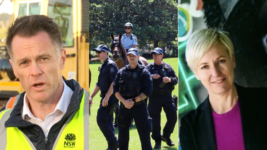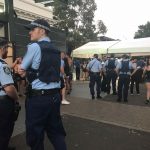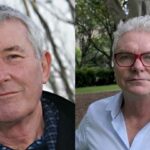NSW Government’s Drug Diversion Scheme is an Abject Failure

The Early Drug Diversion Initiative that was quietly implemented by the Minns government early this year, has again been found to be an abject failure, and no one who’s been paying attention to the drug law reform debate in NSW over the last decade is too surprised, although quite a few of those who it failed might be shocked to learn that the scheme even existed at the time of their arrest.
The EDDI is a drug diversion scheme that allows NSW police officers, at their own discretion, to issue people caught with a small amount of a prohibited drug with a $400 on-the-spot fine, which can be waived if they choose to be “diverted into the scheme” to take a one-hour-long drug counselling phone session with the Alcohol and Drug Information Service.
NSW Greens MLC Cate Faehrmann has just obtained a second set of statistics, via ministers in parliament, outlining that since the scheme has been operating, 24 February 2024, and up until the 12 August, NSW police officers had only exercised their discretion not to arrest someone for a small amount of drugs 436 times, compared with the 6,332 times it was felt better to charge the individual.
The community has been loudly calling for decriminalisation since 2018. And if this harm reduction scheme had been implemented by Minns, instead of taking the thought-to-be voter-friendly option in February, it would mean that over 6,000 people in NSW wouldn’t have been criminalised and had their entire lives thrown out over a health issue that law enforcement exacerbates.
But only 6.4 percent of NSW citizens and residents that could have been saved from the oppressive grip of the criminal justice system were diverted by foot soldiers whose job it is to make arrests and ring up charges.
Letting off a few
The fact that most of the population has never heard of the EDDI probably has an effect at the point of arrest, as a civilian being aware of their rights is much more likely to produce an outcome favourable to them. But as it is, the statistics suggest many officers and even entire Police Area Commands may be unaware of the new initiative, as they’ve neglected to apply it.
Fifteen PACs had diverted no civilians into the scheme between May and August this year. Yet, all have arrested people over minor drug offences. And as for PACs that have taken up the EDDI, Auburn stands out, as it had diverted 36 and charged 59, so 37 percent of cases had been diverted, while Sydney City came in second, in charging 97 and diverting 18, or 15 percent, of those in possession.
Of the 6,332 civilians who were charged with possession of a substance that the authorities have never been able to control via prohibition, 1,186, or 18.7 percent, of them were First Nations people, which is a disproportionate number, when considering Aboriginal people only account for 2.9 percent of the entire state population.
And as for reprieves, 33 First Nations persons, or 7.5 percent of all those found in possession, were dealt with via the EDDI.
In terms of reasons to arrest people between the 25 May to 12 August, individual NSW police officers found it necessary to charge 1,467 civilians with drug possession due to a personal amount of cannabis, which is an offence contained in section 10 of the Drug Misuse and Trafficking Act 1986 (NSW), and it saw them facing up to 2 years imprisonment and/or a $2,200 fine for a bit of grass.
And perhaps the most glaring failure of the scheme is that only 21 individuals issued with a criminal infringement notice, or 4.8 percent of the 436 of those given an on-the-spot EDDI fine chose to actually take the drug counselling session, which is free-of-charge.
As Faehrmann put it at the time she released the first set of figures in June, when launching this initiative in October, “the government said that it sought to ease the burden on police and courts, allowing resources to be reprioritised to focus on the suppliers and manufacturers of illegal drugs”. Yet, it appears no one has informed officers on the ground of this.
Avoidance behaviour
The big takeaway from the November 2019 delivered findings of the NSW Corners Court’s Inquest into the Death of Six Patrons of NSW Music Festivals and the March 2020 released final report of the Special Commission of Inquiry into the Drug Ice was these official government undertakings recommended decriminalisation for personal possession and use.
But this finding coming from two esteemed sources was not what the then Coalition government wanted to hear, having spent years pushing its tough-on-drug-crime agenda. So, it recoiled into a corner and didn’t respond to recommendations for over two years, with the Berejiklian government having received it in January 2020 and the Perrottet government responding in September 2022.
And the reason why Minns has gone with the EDDI scheme is that this is the proposal that current opposition Liberal leader Mark Speakman put on the table as an alternative to drug decriminalisation following the inquiries, both in November 2020 and again, in June 2022.
So, basically, the March 2023-elected NSW Labor government has gone with the option the current Liberal leadership had been toying with in order to avoid implementation of what the community actually wants which is that those found in possession of or using an illicit substance are no longer subjected to criminal penalisation.
As it is the EDDI only permits two diversions before a third instance of drug possession requires arrest and charging.
And despite NSW Labor having run on a platform that prioritised at least consideration of appropriate drug law reform, when the Minns government got in, it went with the safe bet for itself and not the community.
The writings on the wall
In 2018, the Uniting Church NSW.ACT launched the Fair Treatment campaign, which calls for drug decriminalisation in both NSW and the ACT. And since October last year, the ACT has been operating a drug decriminalisation policy, which has not led the sky to fall in. In fact, there has hardly been a peep out of the capital on this issue since its launch, which suggests its lack of adverse impact.
Fair Treatment has over 70 NSW civil society and legal organisations partnering with Uniting, calling for drug decriminalisation in this state. These include the NSW Bar Association, the University of Sydney, Human Rights Watch, the NSW Council for Civil Liberties, Australian Lawyers for Human Rights and the Australian Salaried Medical Officers Federation of NSW.
The Murdoch press, however, challenged Minns’ opinion on the option that his government might implement drug decriminalisation, similar to the ACT, in August 2023, which saw him ruling out drug decriminalisation as an option, as well as postponing the promised NSW Drug Summit to some distant point in the future, which led to a yearslong campaign to get it put on the agenda this year.
But the good news is that the NSW Drug Summit is set to take place over four days: two in October and two days in December.
And the fact that Faehrmann has already twice proven that the watered-down drug decriminalisation alternative, the EDDI, is not going to service as a viable alternative to turning towards a rights-forward, health centred approach to personal drug use, which is decriminalisation, means that such alternatives have already been thoroughly discredited prior to any debate on the desired reform.







